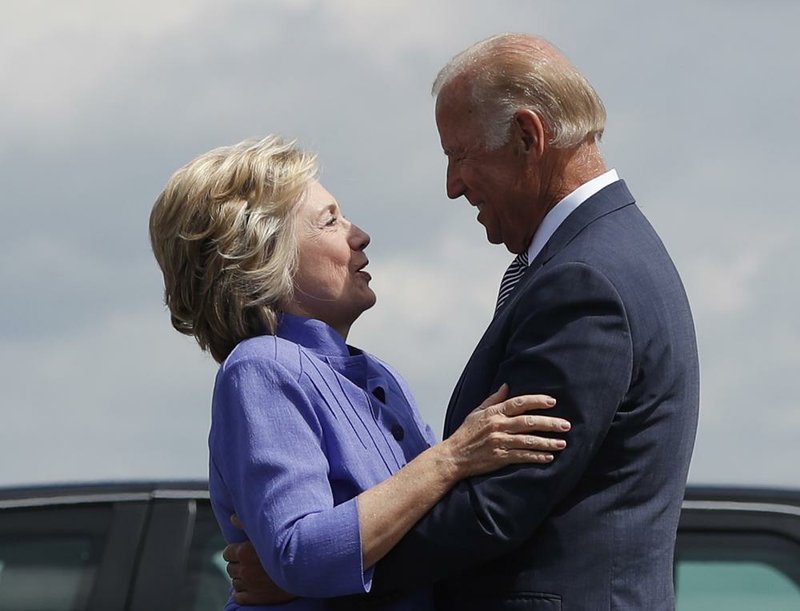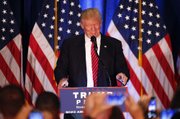YOUNGSTOWN, Ohio -- Donald Trump called Monday for "extreme" ideological vetting of immigrants seeking admission to the United States, vowing to overhaul the country's screening process and block those who sympathize with extremist groups or don't embrace American values.
FULL ELECTION COVERAGE
He laid out a broad, nonspecific plan for destroying the Islamic State militant group, including joint and coalition military operations, cutting off funding, and shutting off access to the Internet.
"Military, cyber and financial warfare will all be essential in dismantling Islamic terrorism," Trump said. "But we must use ideological warfare, as well."
To do that, Trump said, his presidential administration would oppose "oppression of women, gays and people of different faiths" and would be allies with, and amplify the voices of, "moderate Muslim reformers in the Middle East."
Regarding immigration, Trump laid out the grounds for which the country would permit a person's entry.
"Those who do not believe in our Constitution, or who support bigotry and hatred, will not be admitted for immigration into our country," Trump said in a foreign policy address in Youngstown, Ohio. "Only those who we expect to flourish in our country -- and to embrace a tolerant American society -- should be issued visas."
Trump's proposals were the latest version of a policy that began with his call to temporarily bar foreign Muslims from entering the country -- a religious test that was criticized across party lines as un-American.
The Republican nominee has made stricter immigration measures a central part of his proposals for defeating the Islamic State, a battle he said is akin to the Cold War struggle against communism. He called for parents, teachers and others to promote "American culture" and encouraged "assimilation."
Trump's address occurred as he has struggled to stay on message and build a consistent case against Democrat Hillary Clinton, roiling the White House race with comments that have frustrated many in his own party. Some Republicans have renounced their support for Trump, while others have even voiced support for Clinton.
Biden joins Clinton
On Monday, Clinton campaigned alongside Vice President Joe Biden in Scranton, Pa., seizing on Republican concerns about Trump.
Introducing Biden at their rally, Clinton sought to sow doubts about Trump's ability to get jobs back into blue-collar communities like Scranton.
She acknowledged that many people in the audience might have friends considering voting for the Republican, but offered this advice: "Friends should not let friends vote for Trump."
Biden, whose Scranton rally marked his first campaign appearance with Clinton, called Trump's views "dangerous" and "un-American." He warned that Trump's assertions last week about President Barack Obama founding the Islamic State could be used by extremists to target American service members in Iraq.
"The threat to their life has gone up a couple clicks," Biden said.
Trump has since said he was being sarcastic in accusing Obama of founding the Islamic State. Still, he directly blamed the president and Clinton, who served as secretary of state, for backing policies that "unleashed" the group, including withdrawing U.S. troops from Iraq in late 2011.
In his Monday speech, Trump challenged Clinton's fitness to be president, declaring she lacks the "mental and physical stamina" to take on the Islamic State.
Trump's most specific anti-Islamic State proposals centered on keeping those seeking to carry out attacks in the West from entering the United States. He said attacks involving "immigrants or the children of immigrants" underscore the need to implement "extreme vetting."
Trump aides said the government would use questionnaires, social media, interviews with family and friends or other means to vet applicants' stances on issues including religious freedom, gender equality and gay rights. Trump did not clarify how U.S. officials would assess the veracity of responses to the questionnaires or how much manpower it would require to complete such arduous vetting.
He said that implementing the policy overhaul would require a temporary halt in immigration from "the most dangerous and volatile regions of the world that have a history of exporting terrorism." He did not identify those regions, saying instead that he would ask the State Department and the Department of Homeland Security to do so if he is elected.
"We will stop processing visas from those areas until such time as it is deemed safe to resume based on new circumstances or new procedures," Trump said.
Last year, Trump first announced his call for banning Muslims. He introduced a new standard after the June massacre at a gay nightclub in Orlando, vowing to "suspend immigration from areas of the world where there is a proven history of terrorism against the United States, Europe or our allies, until we fully understand how to end these threats."
That proposal raised numerous questions that the campaign never clarified, including whether it would apply to citizens of countries such as France, Israel, or Ireland, which have suffered recent and past attacks.
Trump had promised to release his list of "terror countries" soon. His announcement Monday that government agencies would create the list appeared to indicate that would not happen before the November election.
Relations with Russia
Trump was vague about what he would do differently from Clinton to decimate the Islamic State in its strongholds in Iraq and Syria. He vowed to partner with any country that shares his goal of defeating the extremist group, regardless of other strategic disagreements, and named Russia as a nation he would like to improve relations with.
"They, too, have much at stake in the outcome in Syria, and have had their own battles with Islamic terrorism," Trump said.
Russia and the U.S. have been discussing greater coordination in Syria, where the Islamic State is part of a volatile mix of groups fighting for power. But they have been unable to reach an agreement on which militant groups could be targeted.
Trump has praised Russian President Vladimir Putin and last month called on Russia to find and release thousands of emails from Clinton, though he later said that was a joke. U.S. officials have said there is strong evidence that Russia was involved in a hack of emails and voice mails at the Democratic National Committee.
On Monday, a Ukrainian official said more than $12 million in undisclosed payments were earmarked for Trump campaign manager Paul Manafort by the pro-Russian political party of Ukraine's then-president, Viktor Yanukovych, from 2007 to 2012. Manafort was a political consultant for Yanukovych at the time. He said Monday that he never received any off-the-books payment.
The Clinton campaign on Monday claimed the Manafort ties, first reported by The New York Times on Sunday night, were evidence of Trump's cozy relationship with Russia.
"Given the pro-Putin policy stances adopted by Donald Trump and the recent Russian government hacking and disclosure of Democratic Party records," Clinton campaign manager Robby Mook said in statement, "Donald Trump has a responsibility to disclose campaign chair Paul Manafort's and all other campaign employees' and advisers' ties to Russian or pro-Kremlin entities, including whether any of Trump's employees or advisers are currently representing and or being paid by them."
The campaign stepped up criticism Monday by suggesting that Manafort pushed for pro-Russia changes to the Republican Party platform and by suggesting that several Trump advisers have links to Moscow.
Manafort, whose international clients have included one-time Philippine dictator Ferdinand Marcos, denied any wrongdoing.
"The simplest answer is the truth: I am a campaign professional," Manafort said in a statement Monday. "I have never received a single 'off-the-books cash payment' as falsely reported by The New York Times, nor have I ever done work for the governments of Ukraine or Russia."
He added that his five-year stint as a political consultant in Ukraine ended after that country's elections in 2014.
Information for this article was contributed by Jill Colvin, Julie Pace, Ken Thomas, Jonathan Lemire and Dmytro Vlasov of The Associated Press and by Katie Zezima and Anne Gearan of The Washington Post.
A Section on 08/16/2016

